Sherlock Holmes and the Copycat Murders Read online
Page 2
For the whole of the journey my friend said not a word and I knew better from the expression on his face than to try and coax one out of him.
The moment we were back in our rooms he did not even stop to take off his coat but hurried across to his chemical apparatus and busied himself with retorts, Bunsen burners and the ash he had scooped up in Montague’s rooms.
As I hung up my own coat and hat I tried to recall all I could of the real Jabez Wilson. Readers of my little narratives of Holmes’ early cases will perhaps remember the case of the Red-Headed League, in which Wilson, a pawnbroker, distinctive for nothing but the flaming colour of his hair, was duped into vacating his premises, while a gang of criminals used his basement to tunnel into the adjacent bank. The whole episode was over ten years ago and Holmes had solved it in his usual brilliant fashion, exposing the arch criminal, John Clay. Was this present business some strange form of long-delayed retribution? Surely not. In any case, I was almost sure I had heard Clay had died in prison. But then, what was behind this bizarre attempt to connect Holmes with the crime?
I could see that he had now brought his experiment to some form of conclusion and I attempted to lighten the strained atmosphere that pervaded the room.
“Well, old fellow, what have you determined? Something like this must be child’s play to someone who has penned that definitive treatise, Distinction Between the Ashes of Various Tobaccos. Why, haven’t I heard you say you can distinguish a hundred and forty different varieties of pipe, cigar and cigarette tobacco?”
Holmes looked at me for the first time since we had left the murder scene and there was the strangest expression in his eyes that I have ever seen. I would have said it was that of a hurt child peering out of that hawk-like face, if I hadn’t immediately dismissed the thought as being ridiculous.
Then he spoke.
“Yes, it is child’s play, Watson, but a rather disturbed child, I fear. I have identified the tobacco very readily. It is a coarse shag made up of an unusual blend of strands. There is only one mixture like it to my knowledge …”
“And that is …?”
“My own.”
Chapter Three
In truth it was one of the strangest days I have ever spent in Holmes’s company. I tried to imagine the sensations he must be experiencing. The analogy that kept occurring to me was that of someone turning a corner and bumping into himself. For a man so used to observing his fellow beings at a dispassionate distance, it must have been unnerving indeed to have that safe perspective torn away.
To begin with he seemed to put the conundrum to one side and made an effort—unusual in itself—to talk of other matters. The concert we were thinking of attending later in the week, the stultifying sameness of the items in the day’s agony columns, those ‘rag-bags of singular happenings’, as he always referred to them. Nonetheless, I knew my friend well enough to perceive that his mind was truly elsewhere and after a while the conversation began to peter out. He was relieved, I could tell, when I invented some urgent business that conveniently took me out of the house.
When I returned, having dined at the club, I found him sitting in an all-too-familiar posture. He was wearing his old mouse-coloured dressing gown and he had collected every available cushion in the room, denuding the sofa and both easy chairs in the process. He had piled them up into a sort of ad hoc divan in the middle of which he was sitting cross legged with an ounce of his favourite shag in front of him. He had settled on his stained old clay pipe and his gaze was fixed on the smoke from it as it wreathed around him and rose to form a cloud near the ceiling. It was Holmes at his most formidable.
The density told me that he had been there some time and, indeed, it was only intermittently that I could discern that Roman profile by the light of the one table lamp he had left burning. It was clear to me that this was more than a three pipe problem. An all night sitting was in prospect and I knew better than to interrupt one of those. Wishing him a cordial, if subdued, “Goodnight”, I closed the door and retired to my own room.
By the time I came down to breakfast the next morning there was no sign of Holmes. Mrs. Hudson had fortunately taken advantage of his absence to restore the room to some semblance of order. The cushions had been replaced and a window opened to clear the air of the tobacco fog. All would have been perfectly normal in our cosy little world, if it had not been for the nagging events of the previous day.
What could they possibly signify? Was Mrs. Gentility totally in error when she seemed to recognise Holmes? In my travels I have come across more than one lady of her kind, her eyesight requiring her to use spectacles but her vanity preventing it. Or was she, in fact, correct? Perhaps Holmes had some business with Montague that he was presently unable or unwilling to divulge and the man’s murder had opened up some sinister by-way that was causing him his undoubted perturbation. Whatever the answer, I was sure of one thing. My friend’s powers of deduction were infinitely more likely to resolve these questions than my own. As a result, I proceeded to apply them to the crossword in my morning paper, once I had done justice to Mrs. Hudson’s ever- reliable breakfast.
The morning passed agreeably, as lazy mornings are apt to do and it was close on noon before the sun shining through the window tempted me to take a stroll, a stroll which wound up inevitably at my club. There, over a decent Beaune, I was able to settle most convincingly—at least to my satisfaction—an argument that had been left unresolved the previous evening. It really is most remarkable how one finds the mot or even the phrase juste the very moment after one leaves the scene of the crime, so to speak. Undoubtedly something to do with brain waves and word association. I resolved to bring it up with Holmes at some future and more propitious moment.
My thoughts were once again on him as I opened the front door of 221B. Mrs. Hudson was not there to answer my ring and I remembered it was her afternoon to visit her married sister in Clapham. As I climbed the stairs I could hear Holmes moving around in our rooms above and for some reason I felt a surge of relief at the accustomed sounds.
I positively burst into the sitting room and was chatting away nineteen to the dozen before I had even hung up my overcoat properly, regaling him with the way I had triumphed in my footling argument at the club. Even to my ears it sounded a little inconsequential and I was not unduly surprised that it did not exactly elicit an enthusiastic response from my friend.
In fact, now that I came to look at him, his manner seemed rather aloof but I put it down to the continued after effects of the previous day’s unsettling experience. He had taken up his position by the window, where the afternoon sun turned him into a virtual silhouette.
Realising that my chatter was falling on near deaf ears and prompting only the merest of monosyllables by way of reply, I resorted to a device that never failed to soothe him when he was in an enervated state.
“Fancy a soothing pipe, old fellow? I don’t know about you but it’s been one of those days as far as I’m concerned.”
And suiting action to utterance, I took a tin of my favourite Arcadia from the occasional table near my chair—as near to a shrine as I ever hope to get—pulled my trusty briar from my pocket and proceeded to fill it.
“Aren’t you going to join me, Holmes?”
“Ah, yes, of course, Watson,” he replied and moved hesitantly across to the fireplace, as if he were in two minds about even so simple a decision. Once there, he did the strangest thing. His hand began to grope around over the surface and I realised that he was looking for his pipe.
Before I could stop myself I had blurted out. “Now when was the last time you left any of your pipes there, old chap? You know what a fuss Mrs. Hudson makes about the marks. In the coal scuttle—where they always are …”
“Of course, stupid of me. Been a little preoccupied today.” And he busied himself ferreting in the aforesaid coal scuttle until he had pulled out a pipe that I could barely remember his using in ages. Then the vague look returned—until I quickly added: “Toe of the Persian slipper … if it’s that terrible old shag of yours you’re looking for. An appropriate and ingenious hiding place, I’ve always thought.”
And then I laughed immoderately to hide what was becoming a very real concern for my friend’s state of mind. I had seen him in all manner of moods over the years we had been companions and while this was not the hyperactive condition that resulted from the cursed needle, it was somehow even more worrying, since—to my knowledge—there was no medical condition to account for it.
Something of my own state of mind must have communicated itself to Holmes, for he immediately put down pipe and tobacco without even pretending to combine the two and hurried back to take his place by the window, his back half turned in my direction.
“Sorry, Watson. You must forgive me. Not myself today.”
And with a last glance down into the street below, he positively dashed to the coat rack and began scrambling into an overcoat.
“I say, Homes, are you sure you’re all right? That’s my coat you’re about to make off with.”
With a muttered apology he seized his own ulster and, without even bothering to put it on, was out of the door. I heard his feet clattering down the stairs, nearly coming a cropper on the loose carpet tread four from the bottom and then the front door slammed behind him.
I resumed my seat and puffed away trying to steady my own nerves and sort out my feelings about this bizarre little episode. Catching sight of myself in the large mirror over the fireplace, I observed grimly and without satisfaction the furrowed brow and realised that the roles had—for the moment at least—been ironically reversed. I was now the one with the three pipe problem. Though if one pipe couldn’t solve it, nothing would.
What was I to do? As his friend and medical adviser
I had twin obligations. Was this the mental breakdown I had so long feared for Holmes? Who could I talk to without breaking my old friend’s confidence and setting off all manner of harmful rumours that might jeopardise who knew what delicate affairs?
Suddenly an idea came to me. Perhaps there was something in this tobacco-inspired therapy after all! An item I had seen in this morning’s Chronicle came back to me and I snatched up the pages lying near my feet and began to riffle through them.
Ah, yes, there it was, a couple of unobtrusive paragraphs on an inside page that had only caught my eye because of a previous encounter …
CONTROVERSIAL MEDICAL MAN
VISITS LONDON
Dr. Sigmund Freud Arrives to
Address Conference
I could see that small bearded figure now sitting opposite Holmes and myself in the lounge at Brown’s Hotel and hear that piping voice as it mangled the Queen’s English. I had first viewed him, I must honestly confess, as something of a joke but—setting his appearance aside—what he had said to us that day had been instrumental in bringing to a safe conclusion one of the most complex cases my friend and I had ever encountered. I seem to remember the outcome had not displeased a certain lady in high places. But my thoughts were wandering off the point …
I noticed from the accompanying text that the good doctor from Vienna would be in town for another two days, staying once again at Brown’s and resolved to renew our previous acquaintance without delay.
Still pondering on how I might best approach the subject when we met, I set about restoring the newspaper to some semblance of order. I do believe Holmes’s aggravating habit of turning the morning press into a veritable ocean of crumpled paper has turned me into a fussier person than nature originally intended. While I was about it, I might as well save some of his wreckage.
Crossing over to his chair, I noticed to my surprise that his own collection of what I might call the more ‘popular’ papers—chosen largely for the more melodramatic aspects of their crime and agony columns—had not even been disturbed but lay neatly folded as Mrs. Hudson delivered them every morning.
Instead, my arrival had clearly interrupted Holmes in the perusal of one of his commonplace Day Books. For as long as I could remember he had been clipping and filing paragraphs that caught his eye concerning people and events. The most outré references were never more than a fingertip away. In this matter he was normally meticulous, taking care to replace the books as soon as he had finished consulting them in his own complex filing system that only he could comprehend. Nonetheless, he could lay his hand on any given reference within seconds. It was, therefore, most unusual, whatever the distraction, for him to leave one of his ‘Bibles’ unshelved.
I picked up the volume in question and examined it. It was a new one that I hadn’t seen before and seemed to be devoted entirely to Germany and German-related affairs. There were cuttings about the Hohenzollern dynasty and copious notes on Kaiser Willhelm II. Several articles dealt with the Socialist movement and outbreaks of civil insurrection in various states.
All of which was rather puzzling to me. Although I knew Holmes had an encyclopaedaic mind, to my knowledge he had never demonstrated any particular interest in our cousins across the North Sea. I would have been prepared to bet, in fact, that he was instinctively impatient with what he regarded as their stolidity of mind. Come to think of it, the only positive remarks I had ever heard him make on matters German had been in praise of the music of Wagner.
I returned to the page at which the book had originally been open when I had interrupted Holmes. It contained a series of clippings, some of them from German newspapers, pertaining to someone called Klaus Geier. From Holmes’s annotations it appeared that he had been a minor diplomat who had surprisingly given up that staid vocation to become an actor. The laconic comment in Holmes’s spidery scrawl employed yet another language—“Plus ça change, plus c’est la même chose!!” My eye was drawn to another of his notations. Next to an English language profile of Geier’s stage career which included the phrase—“Geier is particularly proud of the fact that his name means ‘eagle’ in his native language …” Holmes had scribbled—“Pride goes before a fall. In fact, the word means ‘vulture’! Ha!”
The printed text continued—“Key to his recent success on various European stages is Geier’s consummate—some say unrivalled—ability to …” Before I could read any more, I heard the front door open and Mrs. Hudson’s voice saying: “Oh, Mr. Holmes, you must have second sight. I’ve only just this minute got back myself. I hope you’ve had a successful day yourself?” Knowing how possessive he was about his files, I quickly replaced the book in the gap on the shelf and resumed my seat.
As a result I didn’t catch Holmes’s reply before he had bounded up the stairs—in marked contrast to the way he had left—and was in the room.
“Ah, Watson, just the man I want to see. A quiet pipe and then a little something at Simpson’s, I think. How would that suit you, old fellow? I’m sorry if I’ve been out of sorts lately but …”
His eyes read the expression in my face in a flash. I have never been good at dissembling at the best of times and I’m sure my features on this occasion were an open book to one who knew me so well. So marked was the contrast between the dour nervous Holmes of a few minutes earlier and the ebullient fellow who stood before me that I had trouble seeing the same man. All of this might as well have been blazoned on my brow.
Before I could find words to express any of it, I was literally saved by the bell. This time it was the frantic pealing of the front door bell, accompanied by Mrs. Hudson’s muttered exhortations to the caller to hold his horses.
As one Holmes and I cried out—“Lestrade!”—and burst into laughter. It was the first time the tension between us had relaxed.
Then the sitting room door opened and a flustered Mrs. Hudson announced our visitor—the much anticipated and even more flustered Lestrade. Without even bothering with the usual courtesies, he thrust a note into Holmes’s hand.
“There’s been another one,” he cried.
Once again I found myself reading over my friend’s shoulder. There was the same kind of cheap notepaper, the same crudely cut and pasted letters. This time the message ran—
GRIMESBY ROYLOTT
REQUIESCAT IN PACE
Chapter Four
“But Grimesby Roylott …”
“Precisely, Watson. Requiescat, certainly—since 1883, if memory serves. In pace, I very much doubt …”
We were bowling along once again in a hansom, courtesy of Lestrade, this time along the Embankment. The Inspector had insisted on a diversion via Scotland Yard to collect a Home Office pathologist en route. I suppose I could have taken it as a slight on my medical competence but that was the least of my concerns. Now we had two of these cryptic messages referring to two of Holmes’ previous cases. What could it all mean?
In my mind’s eye I could still see the distraught figure of Helen Stoner, sitting tense in her chair at Baker Street on that April morning as she shared with us her fear of her stepfather and of Roylott’s brooding presence at Stoke Moran, the ancestral family seat where we had faced evil incarnate. Despite all that has happened since, I am still inclined to believe that it was the case which presented more singular features than any other in our long partnership. The very memory of it made me shudder involuntarily, despite the warm day and I reflected—not for the first time—on the way a smiling sun and a clear sky can be a deceptive mask for the sinister thoughts that lurk in the human heart.
Lestrade was clearly going though some equally contorted mental processes of his own as he sat opposite us turning the latest note this way and that, as if he expected it to suddenly reveal its secret, once he had it in the correct position. Finally, he gave up.
“Well, what do you make of it, Mr. ’Olmes?”
“I have made it a life rule, Lestrade, not to make bricks without straw or to theorise without adequate data. However, I am prepared to make one firm prediction …”
“And that is …?”
“Whatever evidence that note may have been able to provide has certainly been obliterated by the way you have just been handling it. I have reason to believe, for instance, that the classification of finger prints, so ingeniously devised by Sir Francis Galton, is likely to be officially adopted by your lords and masters within a twelvemonth. After which, if there is any justice—which I am sometimes inclined to doubt—your recent behaviour would probably rank as a capital crime.”

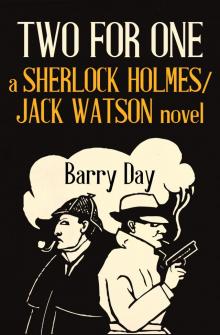 Two for One
Two for One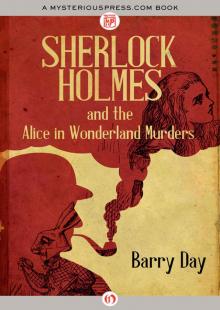 Sherlock Holmes and the Alice in Wonderland Murders
Sherlock Holmes and the Alice in Wonderland Murders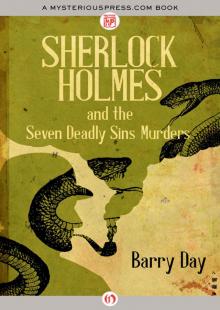 Sherlock Holmes and the Seven Deadly Sins Murders
Sherlock Holmes and the Seven Deadly Sins Murders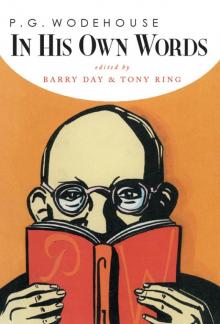 P.G. Wodehouse in his Own Words
P.G. Wodehouse in his Own Words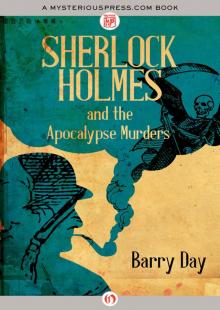 Sherlock Holmes and the Apocalypse Murders
Sherlock Holmes and the Apocalypse Murders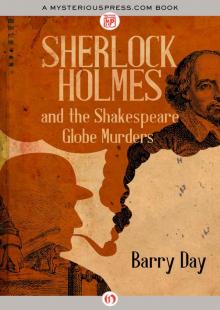 Sherlock Holmes and the Shakespeare Globe Murders
Sherlock Holmes and the Shakespeare Globe Murders